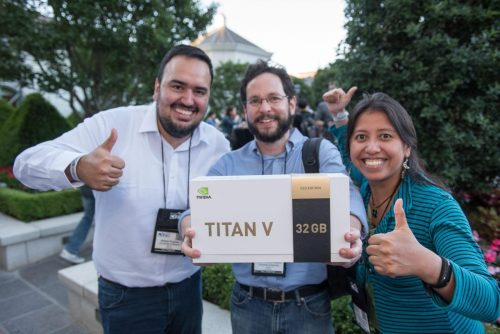
You know a company must shower in money if it’s handing out $3,000 graphics cards for free. That is exactly what happened during the Computer Vision and Pattern Recognition (CVPR) conference in Salt Lake City, Utah, as Nvidia CEO Jensen Huang randomly selected 20 individuals from more than 500 attendees to receive a signed, limited-edition Titan V CEO Edition graphics card.
So why the expensive gift-giving? Call it a reward for working in artificial intelligence and related fields. According to Nvidia, Huang simply walked up to these random 20 “titans of A.I.” roaming the Grand America Hotel center courtyard and handed them a signed limited-edition graphics card. For instance, one lucky recipient was A.I. researcher Fabio Ramos from the University of Sydney who is currently working in the field of robotics.
“My work is focused on helping robots make decisions autonomously. I hope to use this to help advance my work to help robots take care of elderly people,” he said.
Although there are no details regarding the CEO Edition of Nvidia’s Titan V graphics card, the package shows it packs 32GB of onboard HBM2 memory versus the “vanilla” add-in card with only 12GB. The original boasts 5,120 CUDA cores with a base speed of 1,200MHz and a maximum speed of 1,455MHz. It requires a 600-watt power supply along with a six-pin and an eight-pin connector. The card ships with three DisplayPort connectors and one HDMI connector.
The Titan V is based on Nvidia’s “Volta” architecture and is the only mainstream card (for now) based on this technology. Volta appears in two other non-mainstream products: The Tesla V100 as part of the DGX-1 system, and the Quadro GV100 for workstations. For PC gamers, the Titan V is the fastest graphics card on the planet if you’re willing to shell out $3,000.
The random Titan X giveaways were just one of two surprises during the conference. Twelve teams of researchers that participate in Nvidia’s A.I. Labs program were brought on stage. Huang presented each team with Nvidia’s Pioneer Award for their work put into papers submitted to the CVPR and “other leading academic conferences.” Teams that received the award include researchers from Stanford University and the Chinese Academy of Science.
“The number of problems you guys are able to solve as a result of deep learning is truly amazing,” Huang said prior to handing out the awards. “We’ve dedicated our company to create a computing platform to advance your work. Our goal is to enable you to do amazing research.”
Nvidia certainly isn’t the game-centric company we once knew. While Nvidia still produces graphics chips for gaming, the company is currently knee-deep in artificial intelligence, cloud computing, autonomous driving, deep learning, all-in-one processors (Tegra) and more. Once known as a gaming GPU company, Nvidia is now at the forefront of an A.I.-driven world where computing is performed in the cloud and virtual assistants handle our needs.
So far, there is no indication of when, if, or how much the CEO Edition will cost if is released on the market.